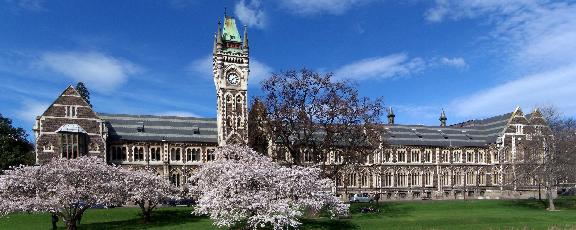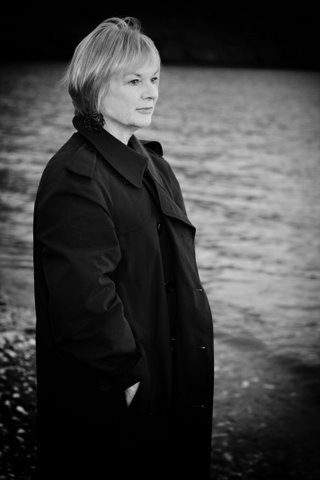Wednesday, September 30, 2015
Guilty or Not Guilty: has Otago University become New Zealand's crucible of crime?
For the longest time, I've thought of Christchurch as the home of New Zealand crime fiction - it's where Dame Ngaio Marsh was born, raised, lived and passed away. It's where Paul Cleave, our most internationally successful crime writer since Dame Ngaio, lives and bases his dark thrillers. It's where the fantastic WORD Christchurch Writers Festival is held - a festival that pretty much always includes a few crime, mystery and thriller authors while other major festivals around New Zealand fall short on that front.
It's also the home of other crime writers including Edmund Bohan (the excellent historic Inspector O'Rorke series), Mark McGinn, Andrew Grant, and Steve Malley. And of course the Ngaio Marsh historic house.
But recently I've begun to wonder - is Dunedin beginning to usurp the crime fiction crown?
Like a titanic battle between Otago and Canterbury in rugby, cricket, or netball, in recent years the southern city has been delivering plenty of shots of its own. Vanda Symon has been a three-time Ngaio Marsh Award finalist for her terrific Dunedin-set Sam Shepherd series and a disturbing standalone. Paddy Richardson has been a twice Ngaio finalist, and continually puts out fantastic Southern-set crime and mystery tales.
Earlier this year, Richardson and Symon were part of an excellent "Murder Most Foul" event with four local crime writers at the Dunedin Writers Festival (Liam McIlvanney and Rogelio Guedea being the others - pictured right).
Then there's Carol Dawber, who wrote a fun outdoors-set crime series back in the 1990s, and now calls Dunedin home. Otago Daily Times sports journalist Rhys Chamberlain has released a crime novel (EMOTION), and Andrew Porteous won the Kingslake Prize for his first effort, A POLITICAL AFFAIR. Young adult mystery writer Ella West, who's superb tale NIGHT VISION won a LIANZA Book Award earlier this year, is also a blue-and-gold-bedecked daughter of Otago.
What's at the centre of this rise in southern crime? Do cold winters and being near the bottom of the world a good crime writer make? Is it Dunedin's recent selection as a UNESCO City of Literature? Or, perhaps, should we be pointing a finger of blame at New Zealand's oldest seat of higher education, the University of Otago? Let me lay out the case against the headquarters of the Scarfies...
Exhibit A: The Scottish crime boss
When he's not penning top-notch crime thrillers set in his home country of Scotland, Mr McIlvanney is molding (corrupting?) the next generation of criminal minds, literary-ally speaking, as the Stuart Professor of Scottish Studies at the University of Otago. He teaches Scottish literature and Tartan Noir.
Liam's been in Dunedin for a few years now, and penned his Ngaio Marsh Award-winning WHERE THE DEAD MEN GO while working at the University. The judges called it "fascinating, brilliant, and challenging... an exceptional thriller entwined with national and workplace politics, sectarian warfare, and the changing face and influence of the newspaper industry".
It's unsurprising McIlvanney feels right at home in Otago - after all Dunedin has plenty of gothic sensibilities, cold winters, and is the most Scottish city outside of Scotland (Dunedin is an amalgam of Dundee and Edinburgh, and there's a statue to Robbie Burns in the main square - well, Octagon in Dunedin's case).
The home of the Scarfies (the nickname for Dunedin's exuberant student population) is rightfully proud of its adopted son's criminal endeavours, and this scion of a prominent Scottish crime family looks like he'll be masterminding plenty of violent incidents in future (we hope), with a third Gerry Conway novel in the works.
Exhibit B: The Mexican crime lord
The greatest universities are true laboratories of learning, bringing world-class experts in many fields together from all over the globe to help their students discover and grow. While Professor McIlvanney has deservedly earned some press for his exploits, a fellow Otago University staff member has rather flown under the radar with his own equally impressive criminal feats.
Dr Rogelio Guedea, an Associate Professor, has been at Otago for a decade, and credits his move to New Zealand with allowing him the freedom, clarity and distance to write crime fiction set in his home country of Mexico. A renowned poet, he is also a bestselling crime novelist in the Spanish language, with an acclaimed trilogy centred on crime in and around the city of Colima. He has been praised for his evocation of rural Mexican life - an aspect of his home country neglected by many of his contemporaries - and nuanced examination of politics, crime, and life in Mexico.
Fortunately for those of us who can't read Spanish, one of Guedea's tales is now available in English, THE BROTHER'S CORONA (Texas Tech University Press, 2014), with hopefully more to come.
Exhibit C: The Poisonous PhD Student
Before she became a superb storyteller, Vanda Symon was a pharmacist - no doubt gleefully imagining the carnage she could cause unruly customers with various potions and poisons, right? A three-time Ngaio Marsh Award finalist, Symon has taken a bit of a break from novel writing since 2012's THE FACELESS, but she's still well-entwined with crime.
Like McIlvanney and Guedea, Symon spends a good chunk of her time at the University of Otago, although in her case it's as part of a PhD thesis on the poisons that our very own Queen of Crime, Dame Ngaio Marsh, used in her Inspector Alleyn tales. When she's not researching how to do away with someone in ways sneaky and undetected, Symon is skewering opponents in Master's level fencing tournaments.
Whether the pen truly is mightier than the sword, or not, our modern-day Empress of Kiwi Crime has both options covered! And after three years working on her PhD, the end is nearly in sight for Symon - so we have our fingers firmly crossed we'll be able to look forward to more Sam Shepherd books in future.
Exhibit D: The Minister of Murder
Professors McIlvanney and Guedea aren't the only University of Otago faculty members prone to penning a crime tale or two. I've recently discovered that Senior Lecturer in Theology Dr Lynne Baab, who moved to Dunedin from Seattle in 2007, has also written a few mystery novels alongside several non-fiction books. You can read an interesting article by Baab about her differing approaches here.
Baab, an ordained minister in the Presbyterian Church in the United States, researches and teaches communication, listening, friendship, leadership, and other topics that affect our everyday lives, approaching them from a Christian and congregational perspective. Her latest mystery certainly adds fuel to the 'Otago is the crime capital' bonfire: DEATH IN DUNEDIN was released on Kindle in August.
In that novel, Lena, a minister of a church in Seattle, is feeling restless and moves to Dunedin on a church exchange, only to then discover a dead body in her new church's car park...
Baab says the first part is inspired by her own life, the latter isn't. But do we really believe her?
Exhibit E: The Writer in Residence
Although she is not (as far as I'm aware - I may be wrong about this) involved with the University of Otago as faculty or student at the moment, Dunedin novelist Paddy Richardson, a two-time Ngaio Marsh Award finalist (for HUNTING BLIND in 2011 and SWIMMING IN THE DARK in 2015) has a strong past association with the university. Back in 1997 she wrote the manuscript for what would become her first novel, THE COMPANY OF A DAUGHTER, while a Robbie Burns Fellow at the University.
That prestigious fellowship is a year-long writer's residency at Otago. Richardson had previously had short stories published in the English Department's magazine. While she was working on what would become her first crime novel, A YEAR TO LEARN A WOMAN, Richardson taught at Otago, and in 2011 she earned the James Wallace-University of Otago residency, which was a three month stint in Auckland at a facility linked to the University of Otago. It was while on that residency that Richardson researched and began writing her excellent crime novel, CROSSFINGERS, which mixed murder with the real-life controversy of the 1981 Springbok Tour.
Following her stint as the Robbie Burns fellow at the University of Otago, Richardson has gone on to publish five acclaimed crime and mystery novels, many of which fall into the 'psychological thriller' category, while also having fantastic evocation of people and place: A YEAR TO LEARN A WOMAN, HUNTING BLIND, TRACES OF RED, CROSSFINGERS, and SWIMMING IN THE DARK.
So with the presentation of the above five exhibits, there is certainly a strong case to be argued that the University of Otago has become the crucible of crime writing in New Zealand, helping Dunedin challenge its northern neighbour Christchurch for the title of Aotearoa's home of crime.
That's the prosecution case... what do you, the jury out there, think?
Subscribe to:
Post Comments (Atom)






You make a good case, Craig. You're on to us...
ReplyDelete